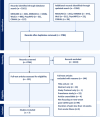Lived Experiences of New-Onset Long Covid Pain and Its Impact on Health-Related Quality of Life. A Scoping Review of Current Evidence
- PMID: 40696830
- PMCID: PMC12284316
- DOI: 10.1111/hex.70352
Lived Experiences of New-Onset Long Covid Pain and Its Impact on Health-Related Quality of Life. A Scoping Review of Current Evidence
Abstract
Introduction: Long Covid (LC) is a multisystem condition that can cause persistent symptoms such as breathlessness, fatigue, cognitive problems and pain, with major effects on individuals and healthcare systems. Globally, nearly 400 million people have been affected. New-onset pain is among the most commonly reported symptoms and may develop into chronic pain, contributing to reduced health-related quality of life (HRQoL) and highlighting the need for appropriate care. Given its global prevalence, exploring how people experience new-onset LC pain and how it impacts their lives can help improve pain management and support services.
Methods: A mixed-methods scoping review was conducted following the Joanna Briggs Institute (JBI) guidance and the Preferred Reporting Items for Systematic Reviews Extension for Scoping Reviews (PRISMA-ScR). The review mapped and synthesised evidence from eligible primary research articles (quantitative, qualitative and mixed-methods) published in English between December 2019 and June 2024. Seven studies using cross-sectional, case-control and observational designs (n = 30 to 2507 participants) were included, with data collected from Europe and Asia.
Results: While qualitative data on lived experience were limited, 69.5% of LC patients reported new-onset pain, most commonly musculoskeletal (MSK) pain (73.2%). Psychological symptoms such as post-traumatic stress disorder (PTSD) were also reported (38%). Pain medications were widely used. Findings suggest that new-onset LC pain affects physical, psychological and social well-being. No studies involving children or adolescents were identified, indicating a gap in the evidence on paediatric experiences of new-onset LC pain.
Conclusion: This review highlights major gaps in the literature, especially the lack of qualitative research on how people experience new-onset LC pain. Future research should explore these experiences in depth, with involvement from patients and the public, to inform the development of appropriate treatment and support strategies.
Patient or public contribution: During the review process, opportunities to involve PPI were not fully explored due to limited awareness of how to support meaningful involvement in a scoping review, alongside time and resource constraints. Such involvement could have helped shape the review question, refine the search terms and interpret the findings in ways that better reflect lived experience. This is acknowledged as both a limitation and a learning point. PPI will be actively embedded in the next phases of the research.
Keywords: SARS‐CoV‐2; chronic pain; long Covid; pain; post Covid; quality of life.
© 2025 The Author(s). Health Expectations published by John Wiley & Sons Ltd.
Conflict of interest statement
The authors declare no conflicts of interest.
Figures
References
-
- World Health Organisation (WHO) . Post COVID‐19 Condition (Long COVID), accessed May 28, 2024, https://www.who.int/europe/news-room/fact-sheets/item/post-covid-19-cond....
-
- Tsilingiris D., Vallianou N. G., Karampela I., et al., “Laboratory Findings and Biomarkers in Long COVID: What Do We Know So Far? Insights Into Epidemiology, Pathogenesis, Therapeutic Perspectives, and Challenges,” International Journal of Molecular Sciences 24, no. 13 (2023): 10458, 10.3390/ijms241310458. - DOI - PMC - PubMed
Publication types
MeSH terms
Grants and funding
LinkOut - more resources
Full Text Sources
Medical
Miscellaneous


